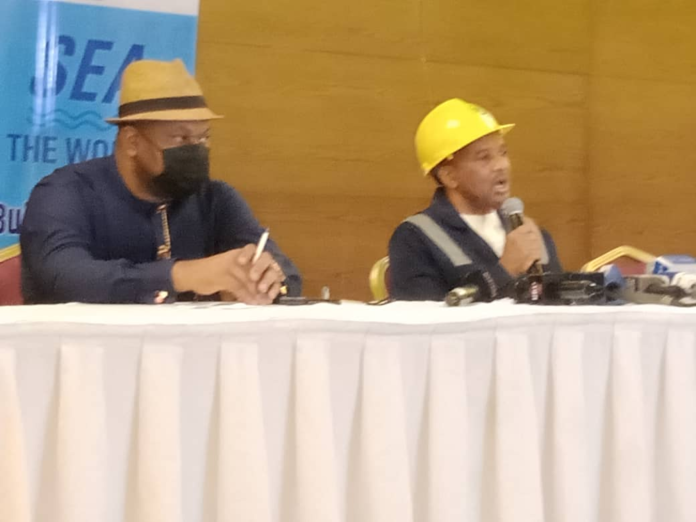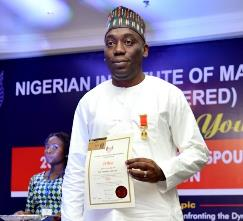
*Removal of Wrecks Underway
*NIMASA Urges Ship Owners to Exercise Patience on CVFF Disbursement
Nigeria has stepped up an intensive campaign to overturn the war risk insurance surcharge payment placed on Nigerian shippers over the years.
The surcharge was imposed following the menace of piracy on Nigerian territorial waters and the Gulf of Guinea (GoG).
Ship owners in the country are expected to get a reprieve in the months ahead if the campaign to end the surcharge payment succeeds in making the international community to see Nigeria in a different light.
The Director General of the Nigerian Maritime Administration and Safety Agency (NIMASA), Dr. Bashir Jamoh dropped the hint at a media parley with journalists covering the maritime sector of the economy in Lagos at the weekend.
Jamoh averred that Nigeria’s campaign is hinged on the fact that the Federal Government has not only made a commitment to address the cause of the menace but also demonstrated it with the recent unveiling of the of the Deep Blue Project by President Mohammadu Buhari in Lagos.
He said that Nigeria was not only involved in tackling the issues of piracy on Nigerian waterways but also what happens generally in the GoG which according to him has been giving Nigeria a bad reputation despite the fact that it was not entirely Nigeria’s responsibility.
The NIMASA helmsman argued that the continued imposition of the war risk insurance was a disservice to the country because of the effect on the national economy just as he pointed out that though the international community was pleased with the efforts by Nigeria on maritime security, the issue of GoG has become the reason why it was yet to review the war risk insurance surcharge on goods coming into Nigeria.
He revealed that an official of the Lloyd’s List Intelligence had acknowledged the efforts by Nigeria, but added that the group was still insisting on charging the war risk insurance until it sees the more commitment from the Federal Government.
According to him, there was an indication that the world was aware of Nigeria’s efforts on checking security on the GoG. We are concern on why the surcharge will continue since Nigeria was not at war.
The international shipping community should do as a demonstration of appreciation of efforts of Nigeria was to at least reduce the war risk insurance surcharge.
His words:
It is significant that critical stakeholders in the world shipping community, like Lloyd’s List are recognising Nigeria’s efforts to make the Gulf of Guinea safe and secure for seafarers and ships. But it would be unfair for the world to sidestep such huge investment and commitment to maritime security and retain the high war risk insurance premium on ships bound for our waters.
“Since the world now acknowledges our commitment to maritime security and the recent improvements in security, it is only fair that relevant stakeholders should begin to rethink the charges that predated such efforts by Nigeria.
The poor masses of this country should not be made to pay for the actions of a few individuals bent on tarnishing Nigeria’s image.”
On security, he said the agency has been able to handle maritime security since the termination of private contract on Safe Anchorage Area (SAA) mainly for security of vessels calling at the nation’s territorial waters.
He explained that the agency was capable of providing needed security for vessels bringing goods into the country just as he pointed out that the termination of the SAA contract moved its available assets to provide security for vessels calling on the nation’s waters.
He said that though there were incidents before it took over, such issues have since reduced with the deployment of security assets.
He disclosed that while it recorded 10 attacks within the exclusive economic zone in January, it has not recorded more than one attack after deploying its security equipment in February after the termination of the SAA contract.
His words: “We took charge of maritime security without any private security operator. Before deployment of security asset, we use to experience attacks almost on daily basis. But after the deployment in February, from December we recorded 10 attacks within the exclusive economic zone. In January, we started operating these items, we recorded one attack in February after the announcement we fully deployed , we recorded zero attack, March one attack, April – two, May – One. We are yet to see any attack in June”.
The Integrated National Security and Waterways Protection Infrastructure, popularly called the Deep Blue Project is designed with three categories of platforms to tackle maritime security issues on land, sea, and air.
While the land assets comprise the Command, Control, Communication, Computer, and Intelligence Centre (C4i) for intelligence gathering and data collection, the 16 armoured vehicles are for coastal patrol; and about 600 specially trained troops for interdiction, known as Maritime Security Unit.
On air, Jamoh explained that there are two Special Mission Aircraft for surveillance of the EEZ, one of which has been received with the second expected to arrive later.
According to him, three Special Mission Helicopters are for search and rescue and four Unmanned Aerial Vehicles. The sea assets consist of two Special Mission Vessels and 17 Fast Interceptor Boats.
Jamoh also used the occasion to reveal that his agency has received the approval of President Buhari to remove all wrecks and derelicts obstructing Nigeria’s territorial waters.
He explained that with the approval, the agency would soon begin the exercise throughout the country even as he revealed that the procurement process for the wreck removal has been completed as well as with the areas of the wrecks identified.
He also pointed out that three agencies of government, namely NIMASA, Nigerian Ports Authority (NPA), and the National Inland Waterways Authority (NIWA) are all empowered by their different laws to remove wrecks.
He however disclosed that the agency has received the consent of the two other agencies to carry out the exercise
The NIMASA helmsman called ship owners to exercise patience on the prolong in the disbursement of the Cabotage Vessel Finance Fund (CVFF). He disclosed that no fewer than 11 stakeholders have been shortlisted as the beneficiaries of the fund.










